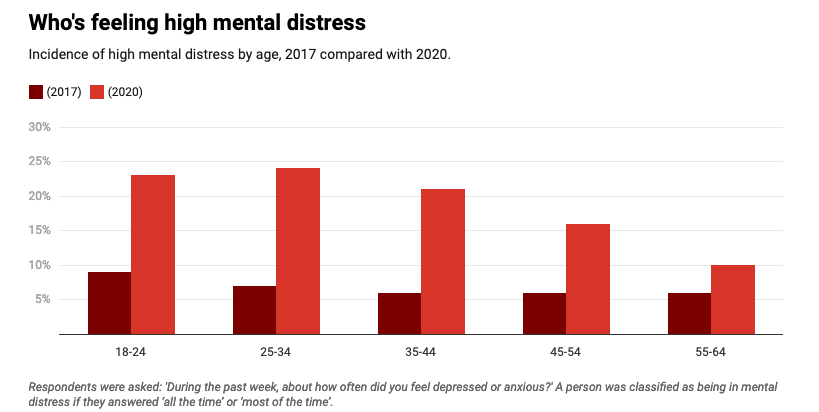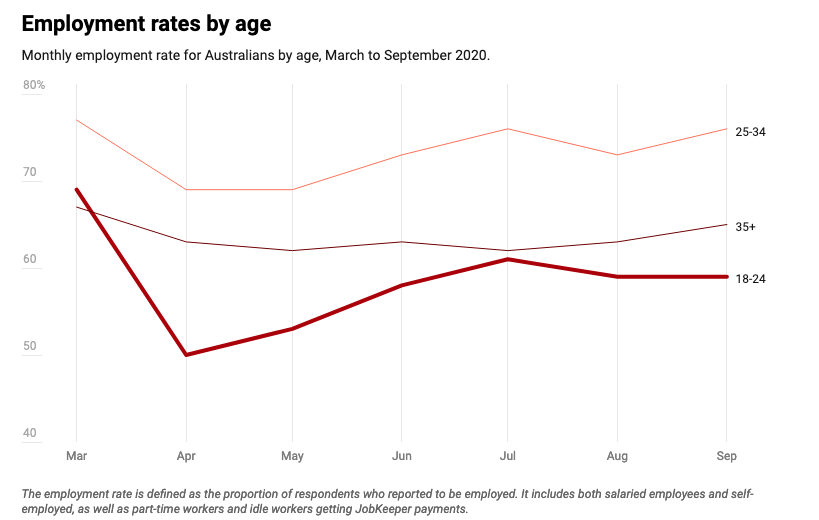Stressed out, dropping out: COVID has taken its toll on uni students
University students are facing a mental health crisis and governments need to step up with real help, argue Susan Harris Rimmer, Kate McGuire and Neeraj Gill.

File image: Pexels
It’s a tough time to be a university student. Amid a global pandemic, overstretched mental health services and sweeping university staff cuts, students have had to attend classes and hand in assignments while juggling work, family and finances. For international students, isolation, cultural differences and extra expenses added to their worries.
Unsurprisingly, university enrolments have plummeted. While COVID-19 has taken a toll on everyone’s mental health – Beyond Blue reported a 66% increase in demand for its services in April compared to 2019 – it’s a massive concern for many young people. Yet tertiary students have been largely overlooked.
To counter the looming mental health crisis and improve student retention, federal and state governments must respond to the needs of these students beyond spouting platitudes and advising them to exercise, drink water and think positively.
Under pressure before the pandemic
Here are the facts: about 60% of university students are aged between 15 and 24. Suicide is the leading cause of death in this age group. One in four young people experience depression or anxiety in any one year.
The average wait time for a first therapy session at a Headspace centre – a government-funded youth mental health program – is 25.5 days. Many don’t reach out at all because of the stigma surrounding mental health, privacy concerns, lack of time and financial constraints.
And 2020 made life harder
Then COVID-19 struck.
This pandemic has increased youth unemployment, added to academic stress and made it harder for students to follow self-care routines – the daily habits that are vital to good mental health and well-being. More students than ever are at risk and the mental health system might not be able to cope.

Chart: The Conversation. Source: Melbourne Institute
After COVID-19 restrictions took effect, the unemployment rate of students aged 15-24 who study full-time increased by up to 12% in June compared to 2019. Their participation rate – the proportion employed or actively looking for work – fell by 21% in May compared to 2019.
Financial pressures associated with job losses can increase the risk of mental health problems. Particularly at risk are international students who were excluded from JobSeeker and JobKeeper payments and isolated from their families and support networks. International students may also face challenges seeking assistance due to stigma, language and cultural barriers and financial issues.

Chart: The Conversation. Source: Melbourne Institute
Challenges increased at uni too
Students have also had to adapt to online learning. Many universities still haven’t gone back to in-person classes. Online videos replaced lecture halls, despite students being told pre-COVID that attending in-person lectures was vital, with lower attendance linked to poorer results.
Some universities did adopt measures to help minimise the impact of COVID on student grades. Even so, the sweeping staff cuts at several universities will have impacts on learning outcomes.
Academic success is harder to achieve than ever and the stakes are high, especially when you might be paying thousands of dollars per course. Bad grades reduce your future employability and repeating courses affects when you graduate.
Stay active, eat healthily and reach out when you need help is the traditional mental health advice doled out to first-year students. But in 2020, when the gyms closed and you couldn’t go out with your friends, it wasn’t that simple.
Most universities do offer some mental health support services. However, these vary between institutions and were already overstretched before the pandemic. While a new framework released by youth mental health research centre Orygen is a promising start, it is yet to be implemented.
The support available to students can be overly reliant on self-help methods or involve long wait times. During COVID, many of these services have gone online, which raises concerns about efficacy and privacy.
Domestic students are eligible for a government-subsidised mental health plan, but the public system faces many of the same issues as university services. International students must pay the full cost.
With the challenges 2020 has thrown at students, it’s no surprise tertiary enrolments fell. Enrolments for 20-to-24-year-olds were down by 66,100 students from 2019. The loss of fee revenue has already undermined the university sector.
The implications for gender equity are also serious, as those who dropped out were overwhelmingly women.
We can do more to help
So it is a tough time to be a university student, but does it have to be? Solutions have already been proposed. In June, a Productivity Commission inquiry report called for:
- expanded online mental health services for tertiary students
- increased data collection
- greater support for international students
- legislative amendments requiring all tertiary institutions to have a student mental health and well-being strategy.
In September, the Australian Human Rights Commission recommended:
- more investment in youth-focused mental health services
- more government support for educational institutions to deliver quality online learning
- making youth employment a key focus of the economic recovery.
Other measures such as psychological support services on campus, university-run guidance programs, greater flexibility regarding workloads and reassurance that students won’t be discriminated against due to mental illness would also help.
If the government were to adopt any of these suggestions it would be a step in the right direction. However, despite the dire consequences of mishandling this issue, it remains to be seen whether the government will step up and support universities and the mental health of students.
Susan Harris Rimmer, Professor and Director of the Policy Innovation Hub, Griffith Business School, Griffith University; Kate McGuire, Research Assistant, Griffith University, and Neeraj Gill, Associate Professor and Clinical Lead, Mental Health, Griffith University
This article is republished from The Conversation under a Creative Commons license. Read the original article.
![]()




